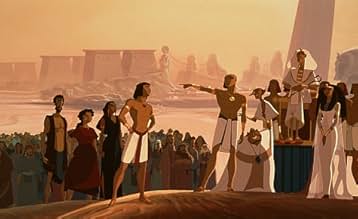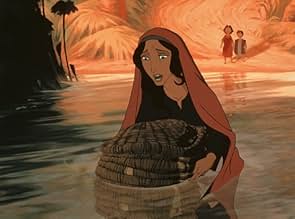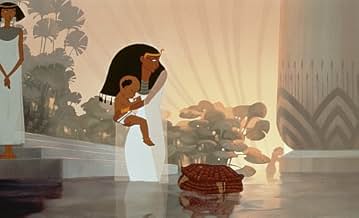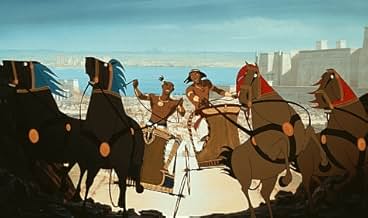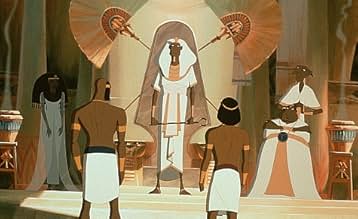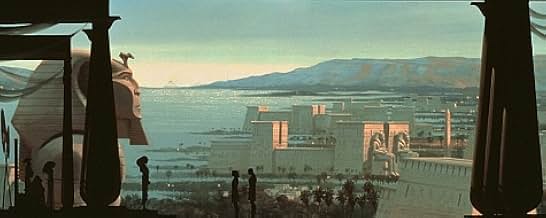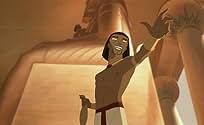El príncipe egipcio, Moisés, se entera de su identidad como hebreo y de su destino para convertirse en el libertador elegido de su pueblo.El príncipe egipcio, Moisés, se entera de su identidad como hebreo y de su destino para convertirse en el libertador elegido de su pueblo.El príncipe egipcio, Moisés, se entera de su identidad como hebreo y de su destino para convertirse en el libertador elegido de su pueblo.
- Dirección
- Guionistas
- Elenco
- Ganó 1 premio Óscar
- 12 premios ganados y 27 nominaciones en total
Val Kilmer
- Moses
- (voz)
- …
Ralph Fiennes
- Rameses
- (voz)
Sandra Bullock
- Miriam
- (voz)
Jeff Goldblum
- Aaron
- (voz)
Danny Glover
- Jethro
- (voz)
Patrick Stewart
- Seti
- (voz)
Steve Martin
- Hotep
- (voz)
Martin Short
- Huy
- (voz)
Francesca Marie Smith
- Additional Voices
- (voz)
- (as Francesca Smith)
Shira Roth
- Hebrew Child
- (doblaje en canto)
- Dirección
- Guionistas
- Todo el elenco y el equipo
- Producción, taquilla y más en IMDbPro
Opiniones destacadas
This is one of the best animated movie of all time. It's not every day that they make a animated movie about a story of the bible. The writers, and animators were very accurate about telling the story. As a Christian I like it when they make movies about the bible. The animation, and music was truly awesome. I like everything about this movie. I recommend this movie to anyone and everyone. Children will love this movie. I'll tell you now you wont be disappointed. I really wasn't.
I saw Mulan, Anastasia and Prince of Egypt in a row. I loved Mulan, I loved Anastasia even more, and now... Well, I must say that Prince of Egypt is probably the best of all. I'd even say, the best animation feature ever produced in the USA (aside from Batman : Mask of the Phantasm).
It is a real piece of art, aiming to entertain everybody, not only act as a baby-sitter movie for kids. There aren't even any pets here. Only a great story, moving scenes, credible characters and fantastic music and storyboard. You will love this one.
It is a real piece of art, aiming to entertain everybody, not only act as a baby-sitter movie for kids. There aren't even any pets here. Only a great story, moving scenes, credible characters and fantastic music and storyboard. You will love this one.
For sheer spectacle, it's tough to beat the Bible. With "The Prince of Egypt," DreamWorks makes good on its promise to deliver a state-of-the-art animated film that will compete favorably with the best Disney has to offer. As with "Antz," released earlier this year, DreamWorks has successfully resisted the temptation to populate this film with characters that can be turned into further revenue through toy sales. (I do wonder, though, if three soundtrack albums--the film's soundtrack, an "inspirational" album, and a "country" album--were really necessary.) The animation team has accomplished something truly spectacular; watching "The Prince of Egypt" is like seeing life breathed into a rich, luxurious tapestry. The Biblical story told in the books of Genesis and Exodus is followed very faithfully, with only minor changes made for dramatic reasons. The action sequences are truly exciting, overall pacing is excellent, and the miracles wrought by God are depicted with awed and respectful wonder. One truly astonishing, harrowing sequence recounts the slaughter of firstborn Hebrew children by bringing hieroglyphic drawings to life on the walls of an Egyptian temple. The voice work is especially good--Val Kilmer is fine as Moses, and Pharoah, voiced by Ralph Fiennes, positively seethes with arrogance and hubris. The storytellers wisely chose to end their tale at the climactic crossing of the Red Sea; even the delivery of the Ten Commandments is portrayed only in an epilogue vignette. (After all, the Israelites wander in the wilderness for forty years after that, and Moses ultimately is not allowed to enter the Promised Land--perhaps not the uplifting ending the filmmakers had in mind.) Some of the subject matter is dark and disturbing, and there is no shying away from the harsh realities of the original texts. By all means, see it with the children in your life--and be prepared to discuss it with them afterward.
As the author of THE WORLD OF ANIMATION, an Eastman Kodak book which won three international book festival awards and as an animation writer-director, I have for many years longed for the U.S. animation industry to remember that Walt Disney, nor any of the pioneers of animation limited their art to children's audiences.
With THE PRINCE OF EGYPT, the DreamWorks animation team has finally taken us full circle and helped the United States join the rest of the world in offering us the first U.S. animated feature since, perhaps, FANTASIA, created for mature audiences while remaining child-friendly. If you aspire to art in any form, and/or specifically love line art and graphics as I do, you must not miss seeing this film on the big screen. I applaud DreamWorks for this triumph in graphic excellence.
Two brief critiques: First, the choice of story. The story is based on Exodus from the Old Testament (and other Scripture) which is scanty, to say the least. Although the studio made an effort to flesh out the story with the Ramses/Moses relationship there is simply not enough meat to go around. This opinion is debatable, a very minor aspect and only my view as a story teller. At the bottom line the overall work is so extraordinary any possible lack in literacy is more than made up for in the visual mounting and production of the film, something which is nothing less than inspiring.
The other criticism is in the highly questionable use of "name" voices for casting, a puzzling development since there is no meaningful box office data supporting it. This practice is known to conflict the viewer psychologically as the drawn images begin to do battle with the ones in the audience memory with the cerebral bridge of highly recognizable photo images of known voices. Walt Disney knew this quite well and avoided it. Indeed, he used the voice of a complete unknown for Snow White, Adriana Caselotti, (who passed away in 1997). Disney was careful to avoid the existing Hollywood queens of song of the period, Judy Garland and Deanna Durbin, the latter, whose prodigious vocal talent actually saved Universal Pictures from going belly up a short time later.
However, at the bottom line, THE PRINCE OF EGYPT will become a true classic and has taken the art of animation up to a new threshold, a model to which future animators will aspire.
Raul daSilva, New Haven, CT, USA
With THE PRINCE OF EGYPT, the DreamWorks animation team has finally taken us full circle and helped the United States join the rest of the world in offering us the first U.S. animated feature since, perhaps, FANTASIA, created for mature audiences while remaining child-friendly. If you aspire to art in any form, and/or specifically love line art and graphics as I do, you must not miss seeing this film on the big screen. I applaud DreamWorks for this triumph in graphic excellence.
Two brief critiques: First, the choice of story. The story is based on Exodus from the Old Testament (and other Scripture) which is scanty, to say the least. Although the studio made an effort to flesh out the story with the Ramses/Moses relationship there is simply not enough meat to go around. This opinion is debatable, a very minor aspect and only my view as a story teller. At the bottom line the overall work is so extraordinary any possible lack in literacy is more than made up for in the visual mounting and production of the film, something which is nothing less than inspiring.
The other criticism is in the highly questionable use of "name" voices for casting, a puzzling development since there is no meaningful box office data supporting it. This practice is known to conflict the viewer psychologically as the drawn images begin to do battle with the ones in the audience memory with the cerebral bridge of highly recognizable photo images of known voices. Walt Disney knew this quite well and avoided it. Indeed, he used the voice of a complete unknown for Snow White, Adriana Caselotti, (who passed away in 1997). Disney was careful to avoid the existing Hollywood queens of song of the period, Judy Garland and Deanna Durbin, the latter, whose prodigious vocal talent actually saved Universal Pictures from going belly up a short time later.
However, at the bottom line, THE PRINCE OF EGYPT will become a true classic and has taken the art of animation up to a new threshold, a model to which future animators will aspire.
Raul daSilva, New Haven, CT, USA
Quite possibly the most astonishing achievement in animation since Beauty and the Beast (and surpassing same), The Prince of Egypt is a lovingly crafted, engaging piece of cinema. The main characters are well-realized, three-dimensional characters. The focus of the film is the conflict between Ramses and his adopted brother, Moses, set against the backdrop of the epic events in the book of Exodus. The result is a religious tale that treats the oft-ignored human element. Instead of merely relating the tale as it is, the story asks "how would a person *feel* if God appeared to them and told them to do this? How would others react?" The script is light-years beyond any past biblical epic. The animation style owes a small debt to Disney's house style, but goes above and beyond in the details in character design (the Hebrews and Egyptians and Midians are clearly of different ethnic backgrounds, and no character suffers from the doe-eyed Disney Belle syndrome). Computer Generated Imagery blends -- for the first time in an animated film -- seamlessly with traditional cel animation. The film also takes some fairly audacious risks; Moses has a dream sequence in stiffly animated hieroglyphics, completely switching animation styles for about five minutes, which I believe is completely unprecedented in animation. There are moments when the visual effects made me forget to breathe. If you blink during the parting of the red sea, you'll regret it. There is, I believe I can safely say, not a second of the film that does not offer some sort of visual delight -- from the deep symbolism of the hieroglyphics to the dizzying chariot race in the opening sequence. The music has been touted by some critics as the film's weak link; such is definitely not the case. Stephen Schwartz' songs combine elements of Broadway-esque show tunes with native Hebrew and Egyptian music. The songs are powerful and moving, sometimes no more than one verse in length, sometimes full-blown seven-minute extravaganzas like "Let My People Go." The one weaker song, surprisingly, is the theme "When You Believe." Even freed from Mariah Carey/Whitney Houston R&B cheese as it is in the movie, it's a watery definition of faith at best. Still, the scene in which it takes place is powerful and the song is beautifully performed. If the film has a weak link, it might be the voice casting,Val Kilmer and Patrick Stewart in particular. The two voices are distinctive of the gentleman who possess them, and thus are distracting in this format. But such is a minor quibble, and should not dissuade anyone from seeing the greatest animated story ever told.
¿Sabías que…?
- TriviaThe production team and executive producer Jeffrey Katzenberg conferred with roughly 600 religious experts to make this movie as accurate and faithful to the original story as possible. After previewing the developing movie, all of the religious scholars, experts, and leaders associated in the making of this movie noted that the studio executives listened and responded to their ideas, and praised the studio for reaching out for comment from outside sources.
- ErroresWhen the plagues destroy Egypt, not a lot of monuments are shown being toppled. However, in the song "When You Believe", when the Hebrews are walking through the ruins of Egypt, there is far more damage and destruction of Egypt that what was seen in the Plagues. However, the entire breadth of the plagues could not be shown since, in the record of them, the plagues last a lot longer than a few minutes, leaving the possibility that we didn't get to see all of the destruction.
- Citas
Moses: Yes, Aaron, it's true. Pharaoh has the power. He can take away your food, your home, your freedom. He can take away your sons and daughters. With one word, Pharaoh can take away your very lives. But there is one thing he cannot take away from you: your faith. Believe, for we will see God's wonders.
- Créditos curiososAt the end of the closing credits, there are verses from religious texts - the Hebrew Bible, the New Testament and the Koran - in praise of Moses.
- Versiones alternativasLater prints of the movie, such as the 2018 Blu-ray release and the Peacock print, add the 2013 Universal Pictures logo.
- ConexionesFeatured in Troldspejlet: Episode #19.13 (1998)
- Bandas sonorasDeliver Us
Performed by Ofra Haza and Eden Riegel
Ofra Haza appears courtesy of BMG Ariola Munich
Produced by Hans Zimmer
Additional arrangements by Martin Erskine and Andrew Lippa
Music and Lyrics by Stephen Schwartz
Selecciones populares
Inicia sesión para calificar y agrega a la lista de videos para obtener recomendaciones personalizadas
Detalles
Taquilla
- Presupuesto
- USD 70,000,000 (estimado)
- Total en EE. UU. y Canadá
- USD 101,413,188
- Fin de semana de estreno en EE. UU. y Canadá
- USD 14,524,321
- 20 dic 1998
- Total a nivel mundial
- USD 218,613,188
- Tiempo de ejecución1 hora 39 minutos
- Color
- Mezcla de sonido
- Relación de aspecto
- 1.85 : 1
Contribuir a esta página
Sugiere una edición o agrega el contenido que falta

Principales brechas de datos
What is the Hindi language plot outline for El príncipe de Egipto (1998)?
Responda

